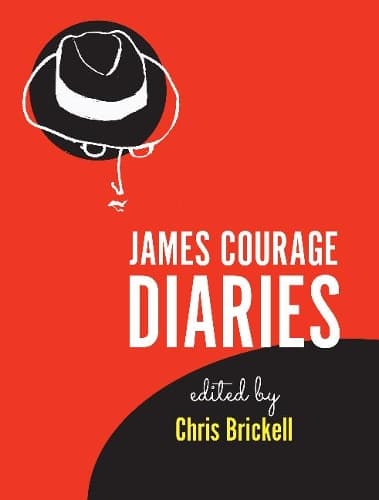Review: James Courage Diaries
Reviewed by David Herkt
Whether it is due to some national reticence or the economic decisions of publishers, New Zealand lacks a significant history of published diaries. The United Kingdom has many important diarists ranging from Samuel Pepys and Virginia Woolf to James Lees-Milne and Alan Bennett. In Europe, every writer, it seems, has had a journal fit for publication. Thoreau, Anais Nin, John Cheever, and Kurt Cobain are well-known American examples.
James Courage Diaries, edited by historian Chris Brickell, is a triumphant and welcome addition to New Zealand’s literary canon. They cover more than 40 years of the writer James Courage’s life in both New Zealand and Europe, observed from a singular viewpoint.
Courage chronicles his time in England after graduating from the University of Oxford, his return to Christchurch in 1934, his experiences on long sea-journeys in a world just before airlines, his time in Argentina, his life during the panic and bombings of the Blitz in the World War II, and his success as a novelist in 1950s London. However, it is in his depictions of homosexual experience and relationships, when both were both illegal and socially sanctioned, that the real value of Courage’s journals will come to be seen.
Placed on a 30 year embargo in Dunedin’s Hocken Library by Courage’s sister, Patricia, following his death in 1963, his diaries can now take their rightful place in the nation’s literary history. Courage is an astute observer, whether of New Zealand landscapes of alps and pine-plantations, the conversations of boys bathing in a South Island river-pool, ship-board manners, half-erotic encounters with young men sketching on clifftop walks in St Ives, or his London nights during Luftwaffe bombings. He records his times with flair.
Brickell’s selection – edited from the 400,000 words of the original – presents virtually unmediated the self-narrative of a man’s life as he confronts and explores his homosexuality, negotiates two distinct nations, New Zealand and England, and deals with the consequences of war on the civilian front. Courage’s diary entries have been chosen with an eye for the luminous detail, from his experience of a seeming scent of the New Zealand bush in Cavendish Square in London, to a brief script-like snatch of post-coital conversation of two homosexual lovers in the 1950s.
James Courage Diaries will also become one of New Zealand’s most important documents of homosexual history.
Its frank recording of emotions and sexuality is a revelation. Brickell’s Introduction carefully situates Courage in his times and provides a biographical frame upon which to pin the entries, but it is in the volume’s “secret thoughts” that its value resides. Very few such explicit documents survive censorious relatives and the vagaries of institutional collections.
The book begins with Courage’s words: “Diary for Myself and No Other,” an intent which meant that words not usually committed to the page in that period – words which could very easily become court evidence, incriminating others as well as the writer – were written and eventually preserved. Charles Brasch, the wealthy homosexual arts patron and founder of Landfall, was also a diary writer, whose journals are published by Otago University Press. His years almost mirror Courage’s. However, he was a completely different man and reticent by comparison.
Brasch’s emotional and sexual relationships have often to be inferred; intimate details are scarce. Courage’s diaries, on the other hand, chronicle with exactitude his various relationships with men, including Frank Fleet, an Argentinian, to the merchant-seaman, Chris Huth, who would lose his life in the war, and eventually to Stuart Hurrell, who would be Courage’s final lover.
Brickell devotes part of the book to Courage’s record of his own psychoanalysis, which again, is a unique document. The relationship of homosexuality to a therapeutic environment is complex and it changed much during the 20th Century. Courage’s 1950s encounters with a psychoanalyst and his written descriptions of them will have much relevance to the history of psychology generally.
James Courage Diaries brings an unjustly near-forgotten writer to vivid life. Brickell’s collection of associated photographs is of equal fascination as the text: a teenage Courage “drags up” in wispy theatrical Arcadian costume in Canterbury bush or, 12 or 13 years later, stands shyly on Mar del Plata, an Argentinian beach, with his lover, Frank. The footnoting explains names and references in the text. The indexing is efficient.
The publication will have wide appeal. Otago University Press has gone from strength to strength and this book is an accurate representation of its production skills. The diary entry itself is also the ultimate style for the era of social media: brief, shaped, perceptive, and a composed snap-shot of a moment in time. The book is a success by any measure.
Reviewed by David Herkt
